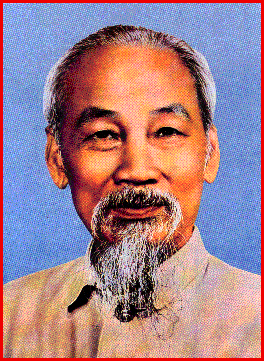

He was born in 1890, at the height of the colonial era, in Nghe An province of Annam as Nguyen Sinh Cung. His father, Nguyen Sinh Sac, was a traditional Confucian success story, studying hard to rise from humble beginings to become a mandarin in the civil service of the Nguyen Dynasty. However, in an act that could not have but impressed his young son, Nguyen Sinh Sac left his post in disgust after the French deposed the uncooperative Emperor Thanh Thai in 1907. As for Nguyen Sinh Cung himself, he claims that this gave him an early hatred for colonial rule and that the liberation of his country became his obsession at an early age. Unfortunately, as with many real and would-be revolutionary leaders, information on Cung's background is sparse and hard to come by, provided mostly by the man himself.
One thing is certain; for a man who later portrayed himself as a nationalist, devoted to his people and country, before his political career he actually spent most of his life thousands of miles away from his homeland and, in a blasphemous act for a Confucian society, neglected the traditional filial rites and had almost no contact with his family after leaving home. After being educated in Hue (at the same school as his later rival Ngo Dinh Diem) he worked as a teacher under the name "Van Ba" before taking a job on a French freighter after which he left Vietnam, not to return for thirty years. Once in France, again quite ironically for such a self-professed nationalist, he tried to get a job with the French Ministry of Colonies, but was rejected as sub-standard. Instead, he went back to sea and took odd jobs at various ports, writing anti-French propaganda and political cartoons in his off hours, even spending a year in the United States.
It was in America that his interest in politics began, being able to meet with Irish, British, Chinese and Indian subversives in metropolitan New York. Now calling himself "Nguyen Tat Thanh" he studied languages and eventually became fluent in French, Vietnamese, Russian and Chinese. After returning to France he worked as a driver for the army during World War I and adopted his more famous alias "Nguyen Ai Quoc" or Nguyen the Patriot. He tried unsuccessfully to be heard at the Versailles Conference after the war. He became a regular feature at socialist and Marxist gatherings, ridiculed the native regime of Vietnamese Emperor Khai Dinh and spoke flatteringly of the "revolutionary" culture of France. Soon, he was the unofficial leader of all leftist Viets in France and began planning a political party and revolutionary program for his native country.
After gaining many important Communist contacts in France and Russia, he returned to Asia and founded the Thanh Nien Cach Mang Dong Chi Hoi or "Revolutionary Youth League" before being forced out by Chiang Kai-shek's anti-Communist crackdown. He travelled abroad again, at one point even impersonating a Buddhist monk in Thailand. He used many more aliases during this time including Nguyen Lai, Nam Son and Thau Chin, though most Vietnamese still knew him only as Nguyen Ai Quoc. He travelled to and was chased out of various countries, constantly avoiding police and at one point even faked his own death. In Hong Kong, in 1929 he founded the Indochinese Communist Party in a soccer stadium, with the intended goal of abolishing both the colonial rule and traditional governments of Vietnam, Laos and Cambodia to create a "Socialist Republic of Indochina". The ICP would be the founding father of such notorious groups as the Khmer Rouge and the Pathet-Lao as well as the VietMinh and later Viet Cong.
Throughout the 1930's Nguyen Ai Quoc continued his propaganda campaign, writing continuously against the French colonialists, the Vietnamese mandarins and the Emperor Khai Dinh, who cooperated with France. Particularly after the French crushed the Viet Quoc mutiny at Yen Bai, the Communists became the leading anti-colonial power and Nguyen Ai Quoc became the most widely known nationalist in Vietnam. Even the new Emperor, Bao Dai, was familiar with his goals and opinions. The great opportunity for Nguyen Ai Quoc came during World War II, when the Japanese occupied Indochina with the permission of the French Vichy government in occupied Europe. Nguyen Ai Quoc began using his VietMinh, under the military direction of former school teacher turned general, Vo Nguyen Giap, to carry out guerilla attacks against both the French and Japanese. His troops were trained, armed and funded with help from America's Office of Strategic Services, the forerunner of the C.I.A. and Nguyen Ai Quoc began a program to rescue American pilots who had been shot down over Indochina. He claimed that the VietMinh was a purely nationalistic party and began to use a new alias: Ho Chi Minh or "he who enlightens".